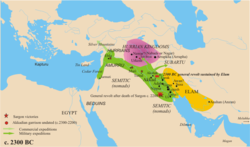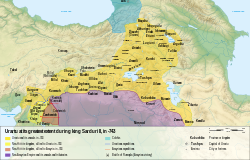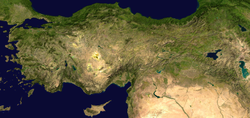other symbols instead of cuneiform script. Hurrian is an extinct Hurro-Urartian language spoken by the Hurrians (Khurrites), a people who entered northern...
82 KB (6,312 words) - 18:46, 4 May 2025
Age. They spoke the Hurrian language, and lived throughout northern Syria, upper Mesopotamia and southeastern Anatolia. The Hurrians were first documented...
35 KB (4,315 words) - 20:19, 25 April 2025
written not only in the Hurrian language, but also Akkadian, Hittite and Ugaritic. It was shaped by contacts between the Hurrians and the various cultures...
91 KB (12,144 words) - 01:55, 25 May 2025
Black Speech (redirect from Black Speech language)
on the ancient Hurrian language, which like the Black Speech was agglutinative. The Black Speech is one of the more fragmentary languages in The Lord of...
21 KB (2,293 words) - 17:07, 4 May 2025
Hurro-Urartian is an extinct language family of the Ancient Near East, comprising only two known languages: Hurrian and Urartian. It is often assumed that...
21 KB (2,322 words) - 17:49, 4 June 2025
The Hurrian songs (or Hurrian Hymns) are a collection of music inscribed in cuneiform on clay tablets excavated from the ancient Amorite-Canaanite city...
24 KB (3,204 words) - 14:24, 14 June 2025
an ergative, agglutinative language, which belongs to the Hurro-Urartian family, whose only other known member is Hurrian. It survives in many cuneiform...
48 KB (5,782 words) - 12:07, 24 May 2025
Northern-Mesopotamia The extinct Hurrian language of the Hurrians Fiction: God in Arcanis role-playing game Hurrians, vegetarian primate species in Isaac...
335 bytes (77 words) - 22:48, 22 June 2024
Canaan (category Articles containing Hurrian-language text)
put forward by Ephraim Avigdor Speiser in 1936, derives the term from Hurrian Kinaḫḫu, purportedly referring to the colour purple, so that "Canaan" and...
130 KB (14,931 words) - 21:07, 1 June 2025
pegs and the associated stone tablet is the oldest known text in the Hurrian language. One of the lions is now housed, along with its limestone tablet, in...
7 KB (731 words) - 09:07, 15 January 2025
reconstruction of Proto-Northeast Caucasian itself. Hurrian language Urartian language Caucasian Albanian language Zimansky, Paul "Urartian and Urartians." The...
12 KB (1,199 words) - 15:34, 16 February 2025
by the Lom minority. The first language that was recorded to be spoken in the Armenian Highland is the Hurrian language, which was spoken in the Mitanni...
28 KB (3,088 words) - 23:01, 10 May 2025
Teshub (category Hurrian deities)
Teshub was the Hurrian weather god, as well as the head of the Hurrian pantheon. The etymology of his name is uncertain, though it is agreed it can be...
132 KB (18,751 words) - 09:42, 25 May 2025
grammar. He stated that it was an agglutinative language; it has been likened to the extinct Hurrian language of northern Mesopotamia. In the fiction, the...
36 KB (4,100 words) - 05:17, 26 May 2025
Kassites (category Articles containing German-language text)
classification of the Kassite language, like the Sumerian language and Hurrian language, is uncertain, and, also like the two latter languages, has generated a wide...
34 KB (3,763 words) - 15:56, 3 May 2025
Mitanni (category Hurrians)
first recorded inscription of their language was of Tish-atal (c. 21st century BC), king of Urkesh. Later on, Hurrians made up the main population of Mitanni...
88 KB (11,175 words) - 17:38, 4 June 2025
Astarte (category Articles containing Hurrian-language text)
her as the counterpart of Assyro-Babylonian goddess Ištar, and of the Hurrian Ishtar-like goddesses Ishara (presumably in her aspect of "lady of love")...
123 KB (14,904 words) - 12:35, 1 June 2025
The Hurrian pantheon consisted of gods of varied backgrounds, some of them natively Hurrian, while others adopted from other pantheons, for example Eblaite...
102 KB (4,223 words) - 09:16, 30 May 2025
Subartu (redirect from Subarian language)
the time that the Subarian language concealed languages like Gutian and Lullubian. But, in the modern day, the Hurrian language is described by the Sumerians...
11 KB (1,380 words) - 05:37, 25 May 2025
two languages. Hurrian may have originated in Armenia and spread to the Mitanni kingdom in northern Mesopotamia by the 2nd millennium BC. The language fell...
120 KB (14,568 words) - 13:10, 25 May 2025
Ḫepat (category Articles containing Hurrian-language text)
Ḫepat (Hurrian: 𒀭𒄭𒁁, dḫe-pát; also romanized as Ḫebat; Ugaritic 𐎃𐎁𐎚, ḫbt) was a goddess associated with Aleppo, originally worshiped in the north...
45 KB (5,935 words) - 18:47, 17 April 2025
Akkad (city) (category CS1 German-language sources (de))
that the name of Agade is not of Akkadian language origin. Proposals include Sumerian language, Hurrian language or the Lullubian (though that is unattested)...
29 KB (4,068 words) - 09:28, 3 June 2025
Mitanni Letter (category CS1 Russian-language sources (ru))
term used in historiography to refer to a document written in the Hurrian language by the Mitanni king Tushratta, dating from the first half of the 14th...
13 KB (1,684 words) - 17:38, 4 May 2025
Chechens (category Articles with Russian-language sources (ru))
relationship between the Nakhsk-Dagestani languages and the Urarto-Hurrians. Other scholars, however, doubt that the language families are related, or believe...
65 KB (6,677 words) - 16:00, 6 June 2025
Humbaba (category Hurrian legendary creatures)
scribal schools, various versions of the Epic of Gilgamesh, and several Hurrian and Hittite adaptations. He is invariably portrayed as the inhabitant or...
68 KB (9,386 words) - 19:12, 23 May 2025
Eblaite, Hittite, Hurrian, Luwian and Urartian; it similarly inspired the Old Persian alphabet which was used to write the eponymous language. The influence...
277 KB (32,388 words) - 07:57, 10 June 2025
Pre-Greek substrate (redirect from Greek substrate language)
languages. Camunic language (probably Raetic) Elymian language (probably Indo-European) Eteocypriot Hattic language Hurro-Urartian languages Hurrian language...
45 KB (4,376 words) - 02:23, 15 June 2025
are either in Hurrian (which appears to have been the predominant language of their kingdom) or Akkadian (the main diplomatic language of the Late Bronze...
78 KB (5,841 words) - 06:51, 12 June 2025
Dark Gods (Anatolian) (category Articles containing Hurrian-language text)
breads mentioned the Heptad and the Hurrian god Ḫašulatḫi; one text reflecting cross-influences between Hittite and Hurrian cults mentioned the Heptad together...
10 KB (1,148 words) - 06:44, 5 May 2025
Anatolia (category Articles containing Turkish-language text)
language remains unclear, while Hurrian language belongs to a distinctive family of Hurro-Urartian languages. All of those languages are extinct; relationships...
81 KB (8,204 words) - 18:50, 14 June 2025
















